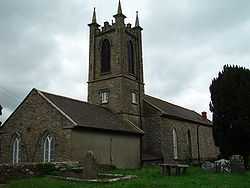Ferns Cathedral
| Ferns Cathedral | |
|---|---|
| The Cathedral Church of St. Edan, Ferns | |
 | |
| 52°35′33″N 6°29′52″W / 52.59250°N 6.49778°WCoordinates: 52°35′33″N 6°29′52″W / 52.59250°N 6.49778°W | |
| Location | Ferns, County Wexford |
| Country | Ireland |
| Denomination | Church of Ireland |
| Website | Ferns Cathedral |
| History | |
| Dedication | St. Edan (Ædan) (Máedóc of Ferns) |
| Administration | |
| Diocese | Diocese of Cashel and Ossory |
| Province | Province of Dublin |
| Clergy | |
| Dean | The Very Rev'd. Dr Paul Mooney |
| Chaplain(s) | Vacant |
| Laity | |
| Organist(s) | S Milne |
The Cathedral Church of St Edan is a cathedral of the Church of Ireland in Ferns, County Wexford in Ireland. It is in the ecclesiastical province of Dublin. Until 1949, the designation of the Cathedral was the Cathedral Church of St. Ædan, a variant spelling of Edan or Aidan.
Previously the cathedral of the Diocese of Ferns, it is now one of six cathedrals in the United Dioceses of Cashel and Ossory.
History
The original medieval Roman Catholic cathedral was built by Bishop St. John in the 1230s. Following the Irish Reformation, a new body was established by decree of the Irish Parliament to became the State Church in the Kingdom of Ireland. The Church of Ireland assumed possession of most Church property. The substantial majority of the population remained faithful to Roman Catholicism. A Catholic cathedral, also dedicated to Saint Aidan, was erected in Enniscorthy in the nineteenth century to a design by Pugin.

The building was burnt down in Elizabethan times by the O'Byrnes of Wicklow, and only a small portion of the ruins remain. Although Queen Elizabeth I of England ordered it rebuilt, only a section of the quire was restored. This was subsequently further altered in the early 1800s.[1] Of the surviving medieval fabric the blind arcading of the chancel is of particular note as are the north and south lancets and viscae of the East Wall. The central lancets are a conjectural restoration. There is a very fine medieval episcopal effigy by the font and the remains of some pillars of the quire arcade are to be seen in the walls to the west of the new chancel arch. The eighteenth or early nineteenth century west tower may well be on the site of a crossing of the mediaeval cathedral. An earlier belief that the present cathedral was part of the nave of the older building was based on the existence of remains of a separate medieval church, on the same axis, some way to the east. The chancel arcade and Eastern lancets challenge this conjecture as does the marked difference of floor level which, in the Eastern fragment, is some metres lower.
Richard de Clare, 2nd Earl of Pembroke (of the first creation), Lord of Leinster, Justiciar of Ireland (1130 – 20 April 1176), also commonly known as Strongbow (French: Arc-Fort), is interred at Ferns Cathedral.
Vandalism
The cathedral was vandalised in early 2009 by youths. Many panes of glass were broken in the cathedral and the pane of glass protecting the magnificent east window was cracked. Headstones in the adjacent St Peter's Cemetery were knocked over, but St.Peter's cemetery and church are under the control of both Catholic and Anglican Churches in the town. Vandalism is common to all 3 churches in the town and also the Abbey.[2]
References
- ↑ The cathedral was reordered again in the early 1900s through the efforts of Dean Gibson. An internal chancel arch was raised, and a quire and sanctuary created. Chapter stall were re-used from Kilkenny cathedral ( the classical stalls which they replaced are now in the extensive chapter house to the west of Ferns cathedral ). A new episcopal 'cathedra' was provide and the flat plaster ceiling of the church replaced with one of boarded wood in a gothic revival style. St. Edan's Cathedral, Ferns. Diocese of Cashel and Ossory. Retrieved on 12 September 2009.
- ↑ Local Notes (25 February 2009). "Yobs create havoc at Ferns Cathedral". Gorey Guardian. Retrieved 23 September 2009.
See also
| Wikimedia Commons has media related to Ferns Cathedral. |
| ||||||||